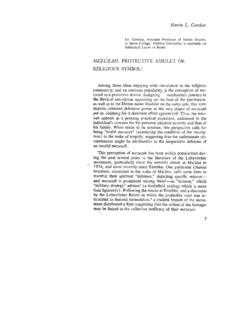Transcription of If There Is No “Da’at,” How Can We Have Leadership?
1 If There Is No Da'at, How Can We have leadership ? Rabbi Aharon Lichtenstein Translation (unauthorized) by Joseph Faith 1. Introduction What is Torah- leadership ? Does it really consist of a special characteristic known as 'Da'at Torah'? I have been asked to discuss these questions, but before I commence my treatment of the issues, I would like to add a note of caution. Discussions such as these, by their very nature, are likely to contain critique of certain forms of leadership . I would like to emphasise that I am not attacking or opposed to any individual on a personal level. My words relate to a general approach that has become prevalent in the Religious and Charedi communities recently. I would therefore request that my words not be applied on a 'practical' level in a simplistic fashion, which would create the impression that they were directed against a particular individual. And let me add that There would be a further problem with any such simplistic application.
2 As we have learnt in the Gemara (Shabbat 97a) regarding the tzara'at of Miriam: "In a similar fashion it is stated, 'And Hashem's anger rose up against them, and he left' (Bamidbar 14) - this teaches that Aharon was also afflicted with tzara'at - so said Rabbi Akiva. Rabbi Yehudah Ben Beteira said to him 'Even if you are right, you will be called to account for saying this! If what you say is true - the Torah concealed it up, yet you reveal it! If what you say is false, then you are libelling that great tzadik'.". Indeed, I do not have the gall to claim that my words are words of 'Torah', but in the same fashion (as the aforementioned Gemara) 'the matter is concealed ( I am not mentioning the names of those who I am criticizing) - yet you reveal them! Either way, he who reveals this is destined to be called to account'. And anyone who seeks to explain who my words are directed against is doing so solely of his own accord.
3 1. 2. The Starting Point My starting point is based on the words of our sages regarding the order of the Shmoneh Esrei. As is well known, after words of 'praise' at the beginning of the Shmoneh Esrei, we move on to 'requests', the first of which is 'You, who gracefully bequeath knowledge ( da'at') to man'. This prompts an obvious question, namely, 'why do we start with a request for knowledge? Are There not greater and more important requests for us to make? One could have assumed that 'knowledge' is indeed the most important thing. This fits in nicely with the Rambam's view that da'at characterises and emphasises the 'image of Hashem' in man, and separates him from other life-forms. However, in the Talmud Yerushalmi (Brachot 5:2) another explanation is given, according to which 'da'at' is a 'key': "..in accordance with the opinion of Rebbi. As Rebbi said 'I am shocked that they removed the request for 'da'at' from the Shabbat prayers.
4 Without 'da'at' what use is prayer? Without 'da'at', how can one make 'havdala' (in which one 'distinguishes'. between shabbat and weekdays)?". In order to distinguish between one thing and another, between blue and green, between a donkey and a wild ass, between one man and another, a person requires 'da'at'. As long as he has not requested, and been granted, 'da'at', a person is not capable of making distinctions. In a similar fashion, 'If There is no 'da'at', how can There be leadership ? In the same way that it is impossible to have prayer or havdala without 'da'at', so too can There be no leadership without 'da'at'. We are discussing a crucial ingredient, a sine qua non, a primary factor without which leadership cannot exist. And just to remove any doubt, we are not merely discussing Torah leadership . The same applies for political leadership , whether for Jew or Gentile. Without 'da'at' how can one have leadership ?
5 This intrinsic requirement for 'da'at' is even more important when we are dealing with the widespread concept of 'Da'at Torah'. 3. 'Da'at Torah' As A Source Of Authority The concept of 'Da'at Torah' was first propounded amongst Lithuanian Jews, and from There it expanded to other religious camps. Much has been written about it over the last few years, and it has been described in a satisfactory manner, and therefore I do not want to discuss it at length. This is not the appropriate forum to discuss this concept's 2. various incarnations from a historical and social perspective, although it is important to define its true meaning and implications. Many interrelated, fundamental questions arise from it. From a normative perspective, the first question is to what extent a Jewish person is obligated to adopt the 'Da'at Torah' doctrine. At its core, this is a question of fact. In light of the axiom which underpins this concept, namely that 'Hashem discloses his secrets to those who fear him, and makes His covenant known to them', is a person who is exceedingly learned in Torah actually an expert in every field, including 'profane' fields (if There really are matters that are not included in the 'holy'.)
6 Realm)? This conception is innovative, inasmuch as we are not discussing the obligation of obeying gedolei Torah merely because of the commandment of 'Lo tasur (You shall not depart from what they tell )', or because of the commandment of 'Ve'asita ke'khol asher yorucha'. (And you shall act in accordance with all that they teach you)', but rather due to two additional suppositions: 1. That a person who has learnt a lot of Torah can be relied upon, and it is appropriate for him to give advice in all fields of life, both holy and profane equally. 2. There is either a halachic or ethical obligation to obey the 'Da'at Torah' of a particular talmid chacham ( one who has learnt enough Torah that he is an expert in all other areas). It may well be that these suppositions have some basis in the words of Chazal, however, certainly not to the extent that some like to present it today. This can been seen from the way that the concept of one's obligation to obey a talmid chacham has been expanded from its original context, wherein it refers to a dayan in a beit din, who acts as a link in the inter- generational chain of halachic jurisprudence.
7 In Parshat Shoftim, it is emphasises that this obligation refers to an actual dayan who sits on a beit din, and one is obligated to adhere to his rulings. When dealing with the obligation to adhere to a ruling in this context, the obligation itself is not particularly surprising, in the same way that in all other areas of life one must obey the person who is in charge of a given system, and directs its policies. A sports-player obeys the team coach; a solider must obey his commander and so forth. According to the 'Da'at Torah' outlook, every Jewish person, who is a part of the Torah system, is obligated to absolutely obey those who stand at its helm - the gedolim. The main innovation here is that a person is not allowed to avoid adhering to the 'dayan' or gadol's ruling, even when he is outside of beit din. 3. Even in his daily routine of going to bed and waking up again, when a person is going on his way, he is obligated to totally obey his 'halachic officer', even if he is not in a court case (in which he is subject to the dayan's decision).
8 The obligation of adhering (to the rulings of 'Da'at Torah') extends to every Jew, in every time and in every place. This obligation, in its broader formulation, is not explicitly expressed in the Torah, but it is the clear implication of the Rambam's words at the beginning of Hilchot Mamrim: "The great beit din in Jerusalem is the central conduit for the Oral Torah, and its members are the chief legal decisors. From them shall law be promulgated to the entire Jewish people. And regarding them has the Torah stated ' according to the ruling which they have decided for you' - this is a positive commandment. And anyone who believes in our teacher Moshe and in his Torah, is obligated to rely on them for all religious matters.". 4. The Commandment of 'Lo Tasur (You shall Not )'. A superficial glance suggests that the concept of 'Da'at Torah' is based on an explicit verse in Devarim (17:11): "According to the teaching that they instruct you, and according to the ruling which they shall tell you, you shall act, you shall not depart from that which they tell you right or left.
9 ". Despite this, There is almost no detailed discussion in the entire Talmud of the commandment of 'you shall not depart'. It would appear that it is restricted to a few limited cases, which are themselves dissimilar from each other in their character. Let us start with the first source, which discusses a rather timely issue. The Gemara in Masechet Shabbat (23) rules that one can make the blessing of 'He who has sanctified us with His commandments' on lighting the Chanukah lights, because the sages instituted this, and Hakadosh Baruch Hu commanded us that 'you shall not depart'. This first appearance of 'you shall not depart' relates, therefore, to the blessing on the Chanukah lights, a blessing that was instituted by the sages. In another case, in Masechet Yoma, the discussion of the commandment of 'you shall not depart' relates to the rabbinic obligation of the 'witnesses oath' due to the commandment of 'you shall not depart', an obligation which is not a 'rabbinic decree' as such, but is rather an implication of another decree that the rabbis instituted.
10 4. Nevertheless, a careful examination of those two cases in which the commandment of 'you shall not depart' is mentioned demonstrates that There is indeed a strong basis for accepting a broad definition of 'you shall not depart', although this implication is not beyond doubt. Examination of these cases demonstrates that the obligation of 'you shall not depart' does not merely relate to standard halachic decision-making, but also to wider-ranging rabbinic decrees. There is no explicit scriptural derivation in the Talmud of the commandment of 'you shall not depart' as it relates to standard halachic decision-making. It seems plausible that this absence is explained by the fact that this is self-evident, and therefore Chazal saw no reason to discuss it. It could be suggested that, as far as Chazal were concerned, the obligation of 'you shall not depart' relates only to the rabbinic authority to enact halachic ordinances, and does not grant them authority in other fields.












